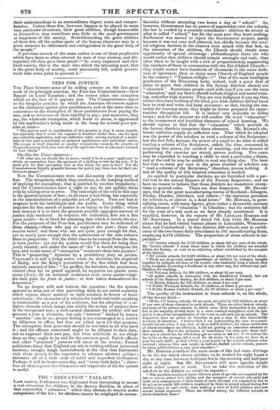FEES FOR JUSTICE.
THE Times bestows some of its telling censure on the last great work of its principal aversion, the Poor-law Commissioners—their Report on Local Taxation ; and the censor takes one exception which on the face of it appears just. The Commissioners object to the irregular practice by which the Assistant-Overseers appear as the claimants against poor parishioners, and at the same time as consenters to the exemption of those parishioners from paying the rate, and as 'witnesses of their inability to pay ; and moreover, they say, the wholesale exemption, which leads to abuse, is aggravated by the application's being made in the lump for several poor per- sons at once-
" The pretext used in justification of this practice is that it saves trouble, but especially that it eaves the expense in Justices' clerks' fees; one fee upon one collective application, and one collective order, serving instead of a multi- tude of fees upon a multitude of personal applications and individual orders. The excuse is itself founded on another irregularity—namely, the practice of the parish paying tliese fees, instead of the applicant, WHO IS LEGALLY LIABLE TO PAY THEM!
On this the Times observes- " Of what use, we should like to know, would it be to a poor applicant' to obtain an exemption from the payment of a shilling or two for his rate, if he must give for that exemption four or five times the sum in fees? Yet the Commissioners literally grumble because the parish pay these fees for their un- fortunate pauper!"
Now the Commissioners were not discussing the propriety of fees. The irregularity which they condemn, is the lumping method of applying for exemption; that is justified by another irregularity ; and the Commissioners have a right to say, do not palliate these evils by adding error to error. The real origin of the evil in this case is the general system of fees ; in all cases a bad thing, but especially in the administration of a palpable act of justice. Fees are bad as respects both the individuals and the public. Every thing which impedes the free march of justice is an injury to the public ; whose best interest it is to have the greatest possible aggregate amount of justice duly rendered. As respects the individual, fees are a fine upon justice—he is fined for obtaining that which is barely his due. For the purposes of the Poor-law, parishioners may be reckoned of three classes,—those who pay to support the poor ; those who receive relief; and those who are not quite poor enough for that, yet so nearly poor enough that the subtraction of the rate reduces them to pauperism. For the third class to be exempt from the rate, is mere justice : yet our fee system would fine them for being thus justly treated; and under the name of "fee" it would reimpose the rate, and in the name of" exemption" reconvert them into paupers ! This is " protecting " injustice by a prohibitory duty on justice. VOLTAIRE'S is still a living satire, when he describes the acquittal of Zadig, and the King's restoration of the fine which had been unjustly exacted of him : " Le greffier, lea huissiers, lea procureurs, vinrent chez lui en grand appareil, lui rapporter ses quatre cents onces (d'or); ils en retinrent seulement trois cents quatre-vingt- dix-huit pour les frais de justice; et leur valets demanderent des honoraires."
To go deeper still and bottom the question : the fee system appears to arise out of that pervading fault in our social economy which rejects direct motives to right conduct, in favour of baser substitutes : the character of a witness for worth and truth, speaking is inadmissible as a test of his evidence, but his adoption of a re- ligious formula which brings him within the action of perjury-laws is the recognized teat; a well-earned character for probity will not procure a man a situation, but only " interest " backed by money "sureties" can do so ; proper feeling is not encouraged as a motive to diligence in office, but fees are relied upon for that purpose. The exemption from poor-rate should be accorded to all who need it ; and the officers concerned ought to be diligent in their duty, not to augment their own pay, but from solicitude to see things done as they ought to be and for the common good. Parish-officers and other " practical " persons will sneer at the notion ; French politicians fancy that England can stir in nothing without interested motives; savages laugh incredulously at the idea that Europeans visit them merely in the eagerness to advance abstract science ; instances all of a rude state of mind and imperfect civilization. Perhaps it will be better some day, and "every little helps " ; there- fore all that exposes the viciousness and inaptitude of the fee system is useful.


























 Previous page
Previous page